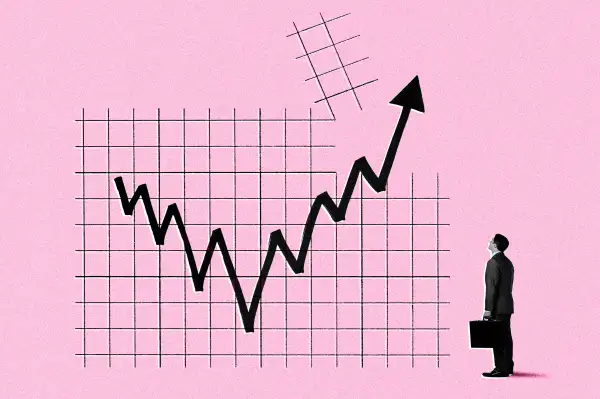Investors Turn to Alternative Assets as Stock Market Braces for 'September Effect'
Money is not a client of any investment adviser featured on this page. The information provided on this page is for educational purposes only and is not intended as investment advice. Money does not offer advisory services.

When September rolls around, it's not just the leaves that start falling. T.S. Eliot famously wrote that April is the cruelest month, but on Wall Street, September holds that distinction. According to RBC Wealth Management, data going back to 1928 shows that stocks decline by an average of 1.2% in September.
Theories to explain the September slump abound, from institutional investors rebalancing portfolios to decision-makers returning from summer vacation. Market pros don’t put too much stock in any of them, though. They also advise against knee-jerk responses to seasonal fluctuations.
“There’s no fundamental reason why September should be worse. The reality is it was a statistical quirk that’s become a self-fulfilling prophecy with algorithmic trading,” says Ross Mayfield, investment strategist at Baird.
Still, even if this September turns into a bumpy ride for investors, Mayfield points out that a seasonal slump doesn't necessarily suggest that the market will sour in 2025. What's more, historical patterns show a correlation between the final few months of the year and market buoyancy.
"If fall tends to be a rockier time for a market, the end of the year tends to be the best time of the year to be in markets. Our view on financial markets is that momentum tends to beget momentum," he says.
Recent data showing downbeat investor sentiment also isn't consistent with a frothy, market-bubble mentality, lending credence to the theory that a tumble would likely be temporary. "I don't sense a euphoria that would signal we’re at a market top," Mayfield says.
Why are investors piling into alternative assets?
While September might be bumpy for stocks, alternative assets are riding a wave of high demand — a trajectory analysts say is likely to persist. “We see this trend continuing to play out in the years ahead," Christian Magoon, CEO of Amplify ETFs, tells Money via email.
Blame the U.S. dollar’s position as the world’s de facto reserve currency — along with our national debt. Investors anticipate that officials will continue relying on debt issuance to finance government operations and subsequently lower interest rates to make servicing that debt less expensive. "Those moves push investors to own assets that can’t be devalued by central bankers,” Magoon says.
A literal and figurative shining example is gold: The per-ounce spot price of the yellow metal definitively broke the $3,500 barrier for the first time earlier this month and has gained more than 34% this year. Analysts attribute this run-up to safe-haven investors seeking an alternative to bonds ahead of expected Fed rate cuts — an assumption heightened by the weak August jobs report released Friday — that could fuel higher inflation.
Experts now say the most likely scenario is a rate cut in September, followed by a second one later this year. About 10% of market observers even expect a super-sized half-percentage point rate cut this month, rather than the more typical increment of a quarter of a percentage point. The futures market puts the probability of rates dropping by at least three-quarters of a percentage point this year at 80% — double what it was prior to the release of the jobs report.
“I think gold is a reflection globally of fiscal worries and the belief that inflation will be allowed to run hotter," says David Stubbs, chief investment strategist at AlphaCore Wealth Advisory. Gold is a traditional investing hedge against inflation, and high inflation erodes the purchasing power of bond yields.
Gold-adjacent products like gold-backed exchange-traded funds (ETFs) have seen greater inflows stemming from these sentiments. Silver has also benefitted from this dynamic: It is up roughly 42% for the year.
Precious metals aren’t the only alternative assets gaining value in this climate. Flagship cryptocurrency bitcoin, along with altcoins like ethereum and even meme coins, have seen strong gains this year. Although bitcoin has retreated from its August record of nearly $125,000, analysts expect this asset class to benefit from continued strong demand.
“Both [bitcoin and ethereum] are well-positioned to challenge fresh record highs before year-end,” LMAX Group strategist Joel Kruger told Barron’s.
Analysts are quick to point out, though, that cryptocurrency is in a class of its own even among alternative assets due to its extreme volatility and lack of intrinsic value. Its evolving stance — and newfound popularity — in Washington is also a significant tailwind.
"The change in tone, in regulatory oversight, has been huge," Stubbs says.
What should ordinary investors do?
If you're wondering what you should do to avoid taking a hit if stocks dip this fall, the answer is simple: nothing that’s not part of your financial plan, according to Baird's Mayfield. “It’s definitely a time where you just expect higher volatility, but I never advocate for making decisions with seasonality being the main thesis,” he says.
While it might be tempting to try timing the market, pros advise against attempting to trade your way out of a slump. Most investors will be best served by being patient and waiting out a seasonal swoon. “It’s something to bake into your expectations," Mayfield says. "Getting out of the market is probably the wrong move.”
The caveat to this advice is that it applies only if recent market gains have distorted your asset allocations. "This year, you have markets at all-time highs, valuations are high and the market is concentrated," says Thomas Martin, senior portfolio manager at Globalt Investments. "I think investors should look carefully at their positioning and ask, ‘Am I truly diversified?’”
Having too much of your nest egg in tech-heavy growth stock funds could leave you exposed if earnings fail to live up to these stocks' outsized valuations, he warns. "When that part of the market has a decline, it’s usually worse and more abrupt," he says.
More from Money:
You Can Thank Everyday Investors for the Continued Bull Market
Are U.S. Stocks Overvalued? Everyday Investors and Experts Disagree
The Stock Market Is at Record Highs. So Why Is Investor Sentiment So Low?




